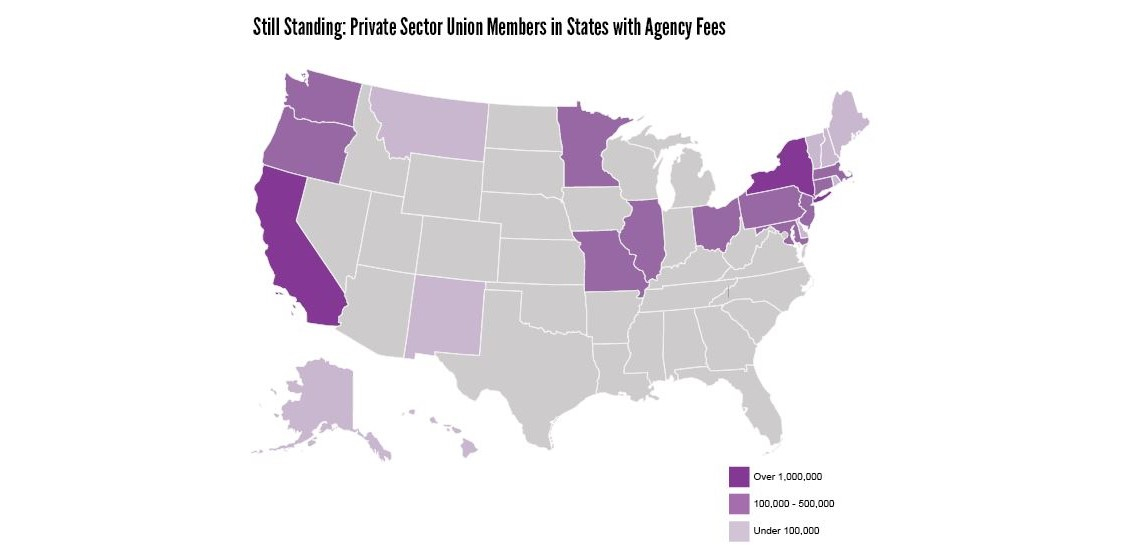Who's Next?

Still Standing: Private Sector Union Members in States with Agency Fees. Design credit: Sonia Singh
Even if the open shop hasn’t hit your union yet, don't get too comfortable.
Rebuilding Power in Open-Shop America
A Labor Notes Guide
labornotes.org/openshop
Context
- How We Got Here
- Our Prescription
- The Racist History of Right to Work
- Who’s Next?
- The Anti-Union Game Plan
Diagnostics
- Exercise: The Open-Shop Stress Test
- Quiz: Assess Your Danger Level
- Jump-Starting a Weak Union from Below
Brass Tacks
If you're one of the lucky ones—say, a Teamster in California or a telecom worker in New York—what do you care? How does the rise of open-shop America affect you? Four ways:
- You’re next. Right-to-work proponents want to finish the job. Expect to be targeted with local, state, or national right-to-work efforts.
- Public services will suffer. Weakening unions in government agencies, hospitals, classrooms, and universities makes it harder for employees to do a good job for the public they serve, from the ER to the local library. Unions will be less able to press for better funding of services.
- Your public sector allies will take a hit. Loss of members and money means unions can’t spend as much on political work, so more enemies of labor may be elected at all levels. Expect a tighter budget too for anything that public sector unions help to fund—such as local coalitions, labor councils, or community groups.
- Public sector wages and benefits will decline, making it harder to maintain your own standards. Expect unfavorable comparisons at the bargaining table. Experience shows that right-to-work laws depress wages all around.
Know Your Lingo

SUPPORT LABOR NOTES
BECOME A MONTHLY DONOR
Give $10 a month or more and get our "Fight the Boss, Build the Union" T-shirt.
In an open shop, workers have the option to receive the benefits of a union without being a member or paying a fee. In other words, you can choose to be a free rider.
The opposite case is an agency shop, where the collective bargaining agreement includes a union security clause. That means everyone in the bargaining unit must either be a member and pay dues, or pay a fair-share fee (also known as an agency fee) to cover the cost of union representation.
So-called right-to-work laws make it unlawful for a collective bargaining agreement to contain a union security clause—that is, they outlaw the agency shop. These laws usually affect both the public and private sectors.
The Supreme Court’s 2018 Janus decision invalidated the union security clause in all public sector contracts nationwide. It also invalidated any state laws requiring public sector workers to pay agency fees, such as in New York. The effect was immediate; there is no grace period.
Sometimes a state right-to-work law comes as part of a larger legislative package attacking public sector unions. For example, Wisconsin’s Act 10 limited public sector unions to bargaining over only one topic, wages, capped at inflation. It also banned dues deductions and mandated annual member votes to recertify the union.
Individual states do not have the authority to make most of these changes in the private sector. Congress could do it.





